Good morning!
Greetings in the name of the father, the Son, and the Holy Spirit.
Don’t be afraid, for I am with you. Don’t be discouraged, for I am your God. I will strengthen you and help you. I will hold you up with my victorious right hand. (Isaiah 41:10)
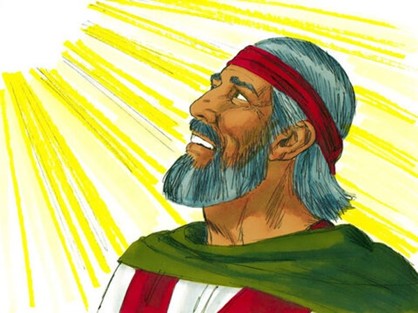
“Go back to Pharaoh,” God, the LORD, commanded Moses. Tell him, ‘This is what the LORD, the God of the Hebrews, says: Let my people go so that they can worship me. If you continue to hold them and refuse to let them go, the hand of the LORD will strike all your livestock—your horses, donkeys, camels, cattle, sheep, and goats—with a deadly plague. But the LORD will again distinguish between the Israelites’ livestock and that of the Egyptians. Not a single one of Israel’s animals will die! The LORD has already set the time for the plague to begin. He has declared that he will strike the land tomorrow.’”
Moses diligently and faithfully went to Pharaoh, who repetitively refused the Israelites to go. Moses knew the outcome. Pharaoh again would not let the Israelites go. While walking to Pharaoh’s palace, Moses counted how many times he went to Pharaoh, and Pharaoh refused. Pharaoh had already suffered from four plagues of blood, frogs, gnats, and flies. Moses could not understand why God sent him again and again to Pharaoh, and God let Pharaoh harden Pharaoh’s heart. But Moses always hoped. It would be the last visit to Pharaoh, and Pharaoh would free the Israelites to go. Moses always prayed to God while telling his hope and desire to God. Yes, Moses was making the fifth visit to Pharaoh.
Again, the palace guards welcomed and guided Moses to Pharaoh. Pharaoh sat on high in his thrown. On that day, Pharaoh looked even more solemn like a god. Moses wondered why people worshipped Pharaoh as their God, but he could understand why on that day. Pharaoh even did not show any facial expression at all as Moses entered in. His high-rank officials were standing before Pharaoh.
Moses remembered the first visit when he came into the palace and met Pharaoh. At that time, Moses could not even think right. He came to deliver God’s message but ended up lifting Pharaoh while minimizing God. Moses was a human being like us. As he fixated his eyes on Pharaoh and Pharaoh’s power on the throne, he was hostaged to the power. Then Moses failed to deliver God’s message fully and wholesomely. It was a bitter failure for Moses. Pharaoh kicked out Moses from the palace. Then his people came and complained to Moses while cursing him. Moses was devastating, but God did not let Moses alone. God came to Moses. God touched Moses. Moses realized what he had done, and he prayed to God for God’s forgiveness. God gladly heard Moses’s prayer and answered. God comforted Moses and reaffirmed Moses’ mission to free the Israelites.
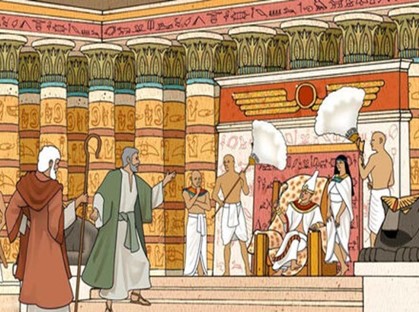
Moses did not want to be in the same situation he fell during the first visit for the fifth visit. Moses closed his eyes and prayed. It made a huge difference. Moses felt God’s presence comforting and bringing peace that he could not experience anywhere. Moses could have been agitated and subdued by the Pharaoh’s solemn look as he did during the first time, but Moses stood firm before Pharaoh.
On the other hand, Pharaoh expected Moses’ visit and prepared. Pharaoh resisted God’s power with his magicians twice, but the rest did not go well. Even his magicians said, “This is the finger of God.” Indeed, he had already begged twice to remove plagues. He also made false promises twice. Now, he had to save his face before his high-rank officials and his people in Egypt. He also had practiced secret rituals to strengthen his mind and soul. Pharaoh made up his mind to behave like a true king. Pharaoh was ready and determined not to repeat his past mistakes but to win this time. It was why Moses felt Pharaoh looked more solemn and more powerful than before. Pharaoh staged all details in his quarter. Moses could not miss this, which reminded Moses of the first encounter with Pharaoh.
Pharaoh carefully observed Moses. Moses looked intimidated initially as getting into his quarter. Then Moses suddenly paused and silently closed his eyes. Moses was motionless for about a minute, which looked odd to Pharaoh. Moses resumed his walking to his throne. It was the same Moses, but Pharaoh could see the difference before being motionless for a while, closing his eyes, and after. Moses was no longer intimidated. Moses had no sign of fear of his solemn power. It was odd. How could Moses be changed in such a short time? Moses looked like a new man possessing mysterious power that Pharaoh did not know. Moses then stood confidently before him.
Moses proclaimed God’s message of the next plague of livestock. Pharaoh clearly heard the message. Pharaoh had to decide whether to release the Israelites or take the next plague, which was the fifth. Pharaoh already thought through the option of leasing the Israelites. It was not acceptable to Pharaoh. Pharaoh badly needed the Israelites’ slaves. He could not find a way to replace two million Israelites’ slaves. The whole nation’s economy heavily relied on the Israelites’ slaves. No enslaved Israelites meant no more prosperous Egypt. As the king of Egypt, Pharaoh could not let this happen. Pharaoh had already made up his mind. No matter what Moses said, Pharaoh decided not to release the Israelites.
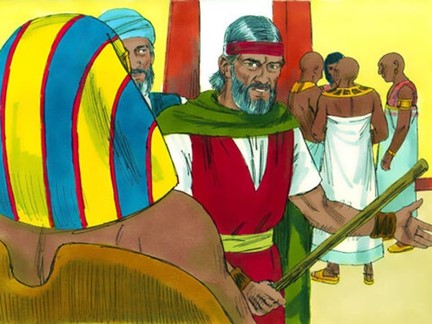
Moses overcame the worldly pressure of Pharaoh’s solemn power that he felt, and Moses firmly stood on his faith. However, Pharaoh was determined not to give in to Moses’ request. Pharaoh was ready to take yet another plague. So far, he and his country had survived. Pharaoh reasoned why his country would not endure yet another plague. Thus, Pharaoh did not care about whatever Moses said. Pharaoh had already prepared his answer to Moses’ request.
The meeting between Moses and Pharaoh did not go well. Moses proclaimed God’s message, and Pharaoh just ignored it. Then Pharaoh politely sent Moses away. Pharaoh indeed wanted to kick him out, but he could not. Pharaoh had a fear of God. Why? The last plague only fell on where the Egyptians lived, not where the Israelites lived. According to Moses, the next plague would fall on only the portion where his Egyptian people lived.
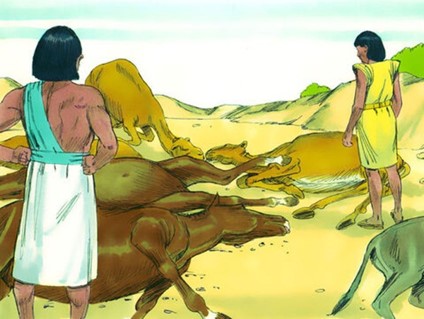
And the LORD did just as he had said. The next morning, all the Egyptians’ livestock died, but the Israelites didn’t lose a single animal. Pharaoh sent his officials to investigate his nation and realized what Pharaoh feared about happened. His officials reported that the Israelites had not lost a single animal! But even so, Pharaoh could not change his position. The Israelites were more valuable than the entire livestock. Pharaoh indeed needed the Israelites as slaves for his country more than before. The only logical conclusion for Pharaoh was to use the Israelites to compensate for the loss. He called his high-rank officials and started to put together a plan to rebuild his country from the damages done by God’s plagues.
Then the LORD said to Moses and Aaron, “Take handfuls of soot from a brick kiln and have Moses toss it into the air while Pharaoh watches. The ashes will spread like fine dust over the whole land of Egypt, causing festering boils to break out on people and animals throughout the land.”
However, Pharaoh was busy rebuilding his nation. Although Moses obeyed God’s command before Pharaoh, Pharaoh gave little attention to Moses. As Pharaoh watched, Moses threw the soot into the air, and boils broke out on people and animals alike. Even the magicians could not stand before Moses because the boils had broken out on them and all the Egyptians. Pharaoh refused to listen, just as the LORD had predicted to Moses.
As a human being, Moses always wanted his trip to Pharaoh to be the last one. However, always it was not the last one. Moses was not mad at God because Moses heard God’s explanation before he went to Pharaoh that Pharaoh would harden his heart and would not let the Israelites go. Thus, Pharaoh’s refusal did not discourage Moses, but it did not encourage him either. Moses had decided to be humble and obediently follow God in all situations. It was Moses’ faith, and it made Moses keep going while trusting in God in any situation. Indeed, keeping faith required many struggles against the self that was deeply buried in Moses himself.
Then God said to Moses, “Get up early in the morning and stand before Pharaoh. Tell him, ‘This is what the LORD, the God of the Hebrews, says: Let my people go, so they can worship me. If you don’t, I will send more plagues on you and your officials and your people. Then you will know that there is no one like me on all the earth. By now I could have lifted my hand and struck you and your people with a plague to wipe you off the face of the earth. But I have spared you for a purpose—to show you my power and to spread my fame throughout the earth. But you still lord it over my people and refuse to let them go. So tomorrow at this time I will send a hailstorm more devastating than any in all the history of Egypt. Quick! Order your livestock and servants to come in from the fields to find shelter. Any person or animal left outside will die when the hail falls.’”
Moses obediently went to Pharaoh and gave God’s word. Pharaoh’s high-rank officials were there with Pharaoh also heard God’s message. Some of Pharaoh’s officials were afraid because of what the LORD had said. They quickly brought their servants and livestock in from the fields. But those who paid no attention to the word of the LORD left theirs out in the open.

So Moses lifted his staff toward the sky, and the LORD sent thunder and hail, and lightning flashed toward the earth. The LORD sent a tremendous hailstorm against all the land of Egypt. Never in all the history of Egypt had there been a storm like that, with such devastating hail and continuous lightning. It left all of Egypt in ruins. The hail struck down everything in the open field—people, animals, and plants alike. Even the trees were destroyed. The only place without hail was the region of Goshen, where the people of Israel lived. Again, it was the purpose to show God’s power and to spread God’s fame throughout the earth.
Then Pharaoh quickly summoned Moses and Aaron. “This time, I have sinned,” he confessed. “The LORD is the righteous one, and my people and I are wrong. Please beg the LORD to end this terrifying thunder and hail. We’ve had enough. I will let you go; you don’t need to stay any longer,” which made Moses excited. But Moses again remembered what God said about Pharaoh, who would keep hardening his heart despite all plagues.
Moses prayed to God. “All right,” Moses then replied. “As soon as I leave the city, I will lift my hands and pray to the LORD. Then the thunder and hail will stop, and you will know that the earth belongs to the LORD. But I know that you and your officials still do not fear the LORD God.”
Due to the hail plague, all the flax and barley were ruined by the hail, because the barley had formed heads, and the flax was budding. But the wheat and the emmer wheat were spared because they had not yet sprouted from the ground. God provided to test Pharaoh’s heart.
So Moses left Pharaoh’s court and went out of the city. Although Moses knew what Pharaoh would do, he lifted his hands to God. The thunder and hail stopped, and the downpour ceased. God heard Moses’ prayer. For Pharaoh, God gave a choice as his next move. When Pharaoh saw that the rain, hail, and thunder had stopped, he and his officials sinned again, and Pharaoh again hardened his heart. Because his heart was hard, Pharaoh refused to let the people leave, just as God had predicted through Moses.
Pharaoh chose to harden his heart, but Pharaoh did not know that God was using him to make God and His power known to the world. Then God said to Moses, “Return to Pharaoh and make your demands again. I have made him and his officials stubborn so I can display my miraculous signs among them. I’ve also done it so you can tell your children and grandchildren about how I made a mockery of the Egyptians and about the signs I displayed among them—and so you will know that I am the LORD.”
For this time, God focused on making God known to His own people and descendants. God gave the most memorial plague to the current and future generations of the Israelites. See how much God had loved His own people. God’s covenant is eternal, but human beings are not
So Moses and Aaron went to Pharaoh and said, “This is what the LORD, the God of the Hebrews, says: How long will you refuse to submit to me? Let my people go, so they can worship me. If you refuse, watch out! For tomorrow I will bring a swarm of locusts to your country. They will cover the land so that you won’t be able to see the ground. They will devour what little is left of your crops after the hailstorm, including all the trees growing in the fields. They will overrun your palaces and the homes of your officials and all the houses in Egypt. Never in the history of Egypt have your ancestors seen a plague like this one!” And with that, Moses turned and left Pharaoh.
After the hail plague, Pharaoh realized that his country could still survive by relying on the wheat and the emmer wheat because the hail did not destroy them. Pharaoh did behave foolishly by hardening his heart again. It is human nature. If there are tiny little cracks to escape, people escape through the cracks. Then people feel safe without realizing that similar or even worse disasters could come and most likely will come. Then people change back their behaviors while quickly forgetting what had happened. People rather learn the lessons and prepare for the future.
However, after hearing Moses’s message, Pharaoh realized that God could take away the wheat and the emmer wheat because God planned to send a swarm of locusts to eat up the wheat, and the emmer wheat, which were spared from the hail plague. Pharaoh started feeling fear of God.
Then, Pharaoh’s officials also came to Pharaoh and appealed to him. “How long will you let this man hold us hostage? Let the men go to worship the LORD their God! Don’t you realize that Egypt lies in ruins?”
So Pharaoh called in Moses. Moses and Aaron came back to Pharaoh. “All right,” Pharaoh told them, “go and worship the LORD your God. But who exactly will be going with you?” Pharaoh started negotiations with Moses.
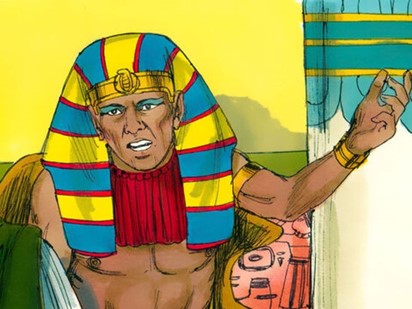
Moses replied, “We will all go—young and old, our sons and daughters, and our flocks and herds. We must all join together in celebrating a festival to the LORD.”
Pharaoh figured it out. If he sent away all two million Israelites, then they would never return to him. Pharaoh needed the Israelites. Pharaohs also knew that they would not leave behind their wives and children. Pharaoh could not accept the term presented by Moses.
Pharaoh retorted, “The LORD will certainly need to be with you if I let you take your little ones! I can see through your evil plan. Never! Only the men may go and worship the LORD, since that is what you requested.” And Pharaoh threw them out of the palace.
There was no more deal. As getting out of the palace, Moses looked up to the heavens and prayed to God. Then he remembered God’s promise to give a perpetually memorable sign about God, God’s power, and God’s love for the descendants of the Israelites. Moses realized that Pharaoh’s refusal was not yet another disappointment but God’s perpetual blessing to the future generations. Moses gave thanks to God.

Yes, Moses could give thanks to God, although there was no deal with Pharaoh. It was not a moment of disappointment of not having a deal with Pharaoh. Instead, Moses could see a much more grandiose blessing to thousands of generations to come. Thus, Moses became thankful to God and even joyful about what was going on, although the outcome was not what he desired. Indeed, Moses failed in his negotiation with Pharaoh. But he gave thanks to God.
Then God responded to Moses, “Raise your hand over the land of Egypt to bring on the locusts. Let them cover the land and devour every plant that survived the hailstorm.”
So Moses raised his staff over Egypt, and the LORD caused an east wind to blow over the land all that day and through the night. When morning arrived, the east wind had brought the locusts. And the locusts swarmed over the whole land of Egypt, settling in dense swarms from one end of the country to the other. It was the worst locust plague in Egyptian history, and there has never been another one like it. For the locusts covered the whole country and darkened the land. They devoured every plant in the fields and all the fruit on the trees that had survived the hailstorm. Not a single leaf was left on the trees and plants throughout the land of Egypt.
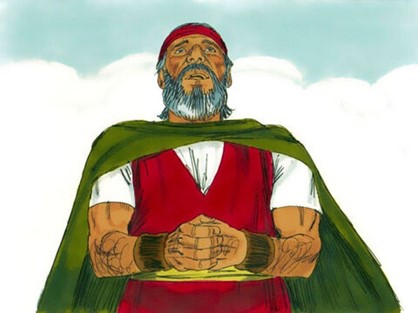
God used Pharaoh and the entire of Egypt to make Himself and His power known to all the nations. As Pharaoh kept hardening his heart, God kept bringing down His plagues to Egypt. It was not a one-on-one match between Pharaoh and God, but God let it happen. Why? God loved Moses, the Israelites, and especially the thousands of generations of His people to come. Yes, it was not obvious to Moses initially, but Moses finally understood this blessing. Moses gave thanksgiving to God because God had done all things for God’s people to come, whom we are the descendants in faith.
Thus, we also have a reason to thank God. Like Moses, we can give thanks to God in all circumstances because we believe, as Moses believed. God brings all things in our lives: good or bad, joy or sorrow, joy or pain, not only for us to unlock the secret of God’s plan made out of His love and praise God, but also for the thousands of generations of His people to come to bring thanks to God while experiencing God and the hidden truth and love of God.
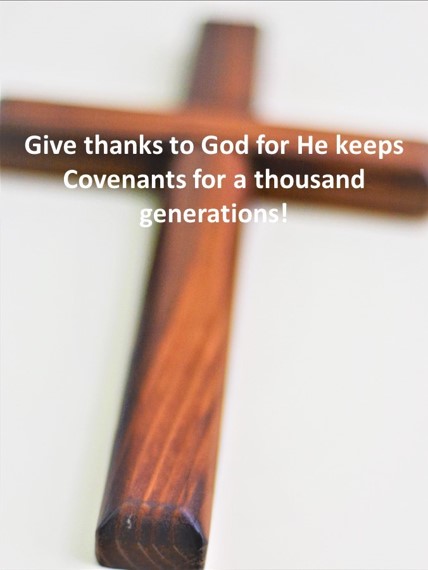
Understand, therefore, that the LORD your God is indeed God. He is the faithful God who keeps his covenant for a thousand generations and lavishes his unfailing love on those who love him and obey his commands. (Deuteronomy 7:9)
give thanks in all circumstances; for this is God’s will for you in Christ Jesus. (1 Thessalonian 5:18)
